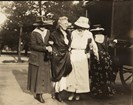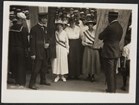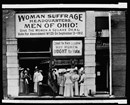In the early spring of 1919, 26 women boarded a train leaving Union Station in Washington, D.C. and headed south. Their goal: to share the story of the horror they endured in prison. They had been arrested for fighting for women’s right to vote.
-
Article 1: Democracy Limited: Introduction

In the early spring of 1919, 26 women boarded a train leaving Union Station in Washington, D.C. and heading south. Their goal: to share the story of the horror they endured in prison. They had been arrested for fighting for women’s right to vote. This article series explores how and why the “Prison Special” aided the cause of women’s suffrage and helped secure the ratification of the 19th Amendment the following year. Read more
-
Article 2: Democracy Limited: Prison, Politics, and the National Woman's Party

In January 1917, the National Woman’s Party began an unprecedented campaign of picketing outside the White House. Dozens of suffragists were arrested and sentenced to jail. The brutal treatment they received there inspired the "Prison Special" tour. Read more
-
Article 3: Democracy Limited: The Prison Special

During the early spring of 1919, 26 of the suffragists who had been imprisoned at Occoquan Workhouse and in DC jails traveled the country by train to share their stories. They called their train the "Democracy Limited," and their tour the "Prison Special." These politically savvy women used their experience as part of their reasoning why women should get the vote. Read more
-
Article 4: Democracy Limited: The Politics of Dress

Suffragists understood the importance of how they and their cause were viewed in mainstream society. They used fashion to gain mainstream support for their cause. Read more
-
Article 5: Democracy Limited: The Politics of Respectability

During the suffrage movement of the early twentieth century, women argued for increased political rights for themselves to a government run by men with little incentive to agree. Cartoons and caricatures in the press at the time demonstrate the ways in which women were mocked and dismissed for stepping out of their traditional role as wives and mothers. Women had to show that what they were fighting for was respectable for women. Read more
